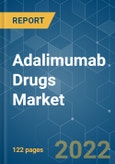The global adalimumab drugs market studied was anticipated to grow with a CAGR of nearly 5.1% during the forecast period. Increasing prevalence of arthritis, growing acceptance of biopharmaceuticals, and presence of well-defined regulatory guidelines in developed economies are among key trends expected to trigger market growth. As per the Global RA Network, arthritis affecting more than 350 million people and became a leading cause of disability which trigger market growth.
Increasing launches of novel biosimilar and rising penetration of generic drugs are estimated to provide a significant boost to the market. For instance, introduction of AMGEVITA by Amgen in 2018 is likely to fuel revenue growth in Europe. Similarly, ABP 501, a novel Adalimumab biosimilar by Amgen, is awaiting approval by 2020. Recently approved biologics such as Hyrimoz (adalimumab-adaz) by Novartis and ABRILADA (adalimumab-afzb) by Pfizer are poised to have strong market penetration due to presence of favorable reimbursement scenario.
Growing patient awareness regarding arthritis disorders and influx of new biopharmaceuticals in the global arena are projected to increase the adoption of adalimumab drugs. In 2019, approximately 54 million adults suffered from arthritis in U.S. alone. Increasing awareness regarding disease remittance therapies and rising healthcare expenditure in developed regions are estimated to promote revenue growth.
However, side effects associated with this drug such as vomiting, nausea, internal bleeding, anaphylaxis, respiratory tract infections may restrain the growth of the market.
Key Market Trends
Rheumatoid Arthritis Dominates the Market and is Expected to Continue to Do the Same during the Forecast Period
- Rheumatoid arthritis is expected to dominate the global adalimumab drugs market through the forecast period. This can be attributed to rising prevalence of rheumatoid arthritis which causes different symptoms such as joint pain, swelling, and stiffness, which are generally accompanied by chronic pain and inability to perform daily activities. Over a prolonged period, this disorder can hamper a patient’s mobility and can lead to permanent joint damage. If left untreated, this disorder can lead to mobility impairment and risk of joint replacement.
- According to the World Health Organization, more than 23 million people live with rheumatoid arthritis. Thus, the rheumatoid arthritis segment is witnessing a shift toward combination therapies that provide enhanced results to patients. Higher availability, positive results, and low price of biosimilar for the target disease are supplementing the growth of the segment. Introduction of new biosimilars such as Hadlima and Adaly in the treatment of rheumatoid arthritis is poised to create a significant shift in prescription patterns.
North America Represents the Largest Market and Asia-Pacific is Expected to Register Fastest Growth.
North America is at the forefront of growth in the region and is also an important revenue contributor in the global arena. Heightened awareness of disease remittance therapies among patients, rising prevalence of RA, and high public and private healthcare spending are stimulating the growth of the region. As per the World Health Organization, an estimated 54.4 million of adults in the United States suffer from rheumatoid arthritis. Moreover, easy access to quality healthcare, favorable reimbursement policies, strong clinical pipeline, and approval of novel drugs are projected to promote revenue growth in North America.
Asia Pacific is likely to post the fastest market throughout the forecast horizon. Growing adoption of urban lifestyle is leading to expanding base of patients in the region. This, coupled with increasing healthcare spending, is expected to propel the market in the APAC region. Favorable regulatory policies for biosimilars are estimated to boost demand for adalimumab over the forecast period.
Price-sensitive regions such as Latin America and MEA have higher acceptance of generic drugs as compared to innovator biologics due to lower price. Increasing demand for biosimilars for disease reversal is poised to augment the regional markets during the forecast period.
Competitive Landscape
Manufacturers offering biosimilars dominate the global adalimumab drugs market. Companies are focusing on building novel chemical entities and innovative molecules to consolidate their foothold. Some of the prominent market participants are AbbVie Inc; Boehringer Ingelheim GmbH, Novartis AG; Pfizer Inc., F. Hoffmann-La Roche Ltd., Cadila Healthcare Ltd, Hetero Healthcare Limited and Amgen, Inc.
Introduction of novel biosimilars and strong clinical pipeline is anticipated to increase competition in the market. For instance, in October 2018, Amgen launched AMGEVITA (biosimilar adalimumab) in markets across Europe with an aim of expanding the range of treatment options for the millions of patients living with target diseases.
Additional Benefits:
- The market estimate (ME) sheet in Excel format
- 3 months of analyst support
This product will be delivered within 2 business days.
Table of Contents
Companies Mentioned (Partial List)
A selection of companies mentioned in this report includes, but is not limited to:
- AbbVie Inc
- Amgen Inc
- Boehringer Ingelheim International GmbH
- Bristol-Myers Squibb Company
- Cadila Healthcare Ltd
- F. Hoffmann-La Roche Ltd.
- Glenmark Pharmaceuticals
- Hetero Healthcare Limited
- Novartis AG
- Pfizer Inc
- Torrent Pharmaceuticals Ltd.
Methodology

LOADING...








